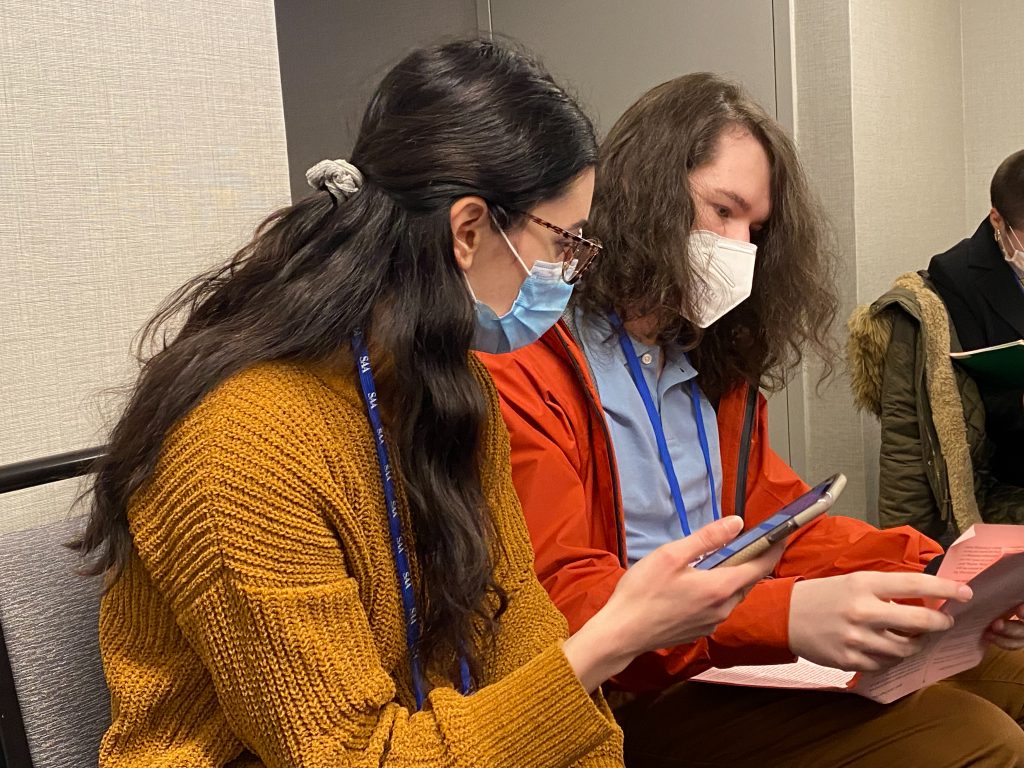After months of study, four Binghamton University students competed in the 17th-Annual Ethics Bowl.
On Thursday, March 31, two graduate and two undergraduate students represented BU at the annual Ethics Bowl, held by the Society for American Archaeology (SAA) in Chicago, Illinois. The team, coached by Hilary Becker, assistant professor in the department of Middle Eastern and Ancient Mediterranean studies, attended the event along with seven other universities. Competitors were expected to debate 10 hypothetical cases surrounding archaeological ethics. BU was eliminated during the first round — losing to the eventual winner of the competition, the University of Tennessee — but aced an ethics trivia contest.
Two cases were presented during each round of the competition, with a coin flip to determine which team would present first. The chosen team was given a few minutes to put together an oral presentation, and as they prepared, the opposing team assembled their response. The presenting team then answered questions from the opposing team and judges. Scores were evaluated based on each team’s intelligibility, depth, focus and judgment.
The first case was a debate on whether stolen artifacts should be returned to their original countries, with the BU team presenting first. The second case was on the existence of human remains that were not reported to the Native American Graves Protection and Repatriation Act (NAGPRA). Em Sidor, a senior double-majoring in anthropology and art history, reflected on the team’s responses.
“We were presented with case five and case four, and we responded by stating how we believed the affected person should approach the situation and the possible solutions/compromises with other affected parties, as well as asking thought-provoking questions in response to the other team’s statement,” Sidor wrote in an email.
To prepare, the team had met twice a week to study the 10 hypothetical cases, according to Cinthia Campos, a fourth-year Ph.D. student studying anthropology.
“As a group, we discussed the cases and did practice debates,” Campos wrote in an email. “We also had faculty sit in as judges, which were very helpful and insightful. We also read over the various ethical codes proposed by organizations including [the SAA], the Register [of] Professional Archaeologists, American Anthropological Association, World Archaeology and reviewed related federal legislation.”
Kyle Berry, a junior majoring in chemistry, plans to use his knowledge of archaeology in his intended career as a physician. Berry described his journey to becoming an Ethics Bowl competitor.
“I have a lot of interest in ethics and archaeology, and I have taken quite a few courses on both of these subjects,” Berry wrote in an email. “It was also a great opportunity to train public speaking, critical thinking and problem solving skills. Additionally, I am in Professor Becker’s archaeological ethics course and have been enjoying the course a lot.”
Becker, who has past experience coaching two teams from University of Mississippi, officially brought BU back into the competition this year, as the event was held in person. An attempt was made to enter last year, but the event was vastly restricted by the COVID-19 pandemic, discouraging BU’s entry. Becker explained how the 2022 team was brought together.
“Em Sidor and Kyle Berry are currently taking [Classics] 383Z: Archaeological Ethics: ‘Who Owns the Past?’, a course offered by the department of Middle Eastern and Ancient Mediterranean studies, which I teach,” Becker wrote in an email. “They volunteered to join the team. We work on SAA archaeological ethics debate cases regularly in the Archaeological Ethics course. [Katharine Nusbaum] was on the Ethics Bowl team in 2020 and recruited [Campos] to join the team this year.”
Katharine Nusbaum, a third-year graduate student studying anthropology, believes the study of archaeological ethics is relevant even outside of the competition.
“Ethics in archaeology is really important to discuss and think through,” Nusbaum wrote in an email. “The reality is that archaeologists encounter a variety of different ethical dilemmas in our work, whether that’s working with descendant communities, the ethics behind how museum collections were acquired or even just navigating the politics of a university setting.”
Though the Ethics Bowl event lasted one weekend, Nusbaum said the knowledge gained from the experience will remain for longer. She shared how the competition may influence her future career, which will potentially be conducting research, educational outreach or managing collections in a museum.
“These are things that are useful to think through and become aware of now, as graduate and undergraduate students, so that you are more prepared and aware when things arise later in your career,” Nusbaum said. “You have already begun to think through what kind of archaeologist you want to be, what principles you want to stand for and in what manner you want to conduct your career.”
Sidor, who also plans to attend graduate school, said the competition provided fuller comprehension of real-life archaeological issues.
“Participating in the Ethics Bowl not only gave me a deeper understanding of what it is like to encounter ethical dilemmas as an archaeologist, attending the SAA Conference was also a heavily enriching experience that connected me to many other archaeologists and opportunities,” Sidor wrote.



